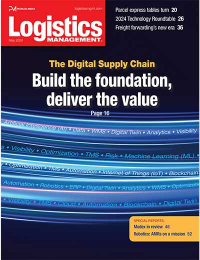Convoy introduces private fleet-based power-only freight service
Latest Logistics News
Q1 U.S. Bank Freight Payment Index sees shipment and spending declines 2024 State of Freight Forwarders: What’s next is happening now What’s next for trucking? TIA rolls out updated version of framework focused on fighting freight fraud National diesel average is down for the third consecutive week, reports EIA More Motor FreightSeattle-based digital freight network Convoy said today it has made an upgrade to its Convoy Go program, in the form of a new power-only service for private fleets.
Introduced in April 2019, Convoy Go is a drop & hook marketplace that enables any United States-based carrier or owner-operator to begin hauling pre-loaded trailers and be able to operate at the same level as large asset-based carriers.
Convoy officials said that its new power-only service through Convoy Go provides private fleets with nationwide capacity to haul pre-loaded and empty dry van trailers. And they added that with its network of more than 300,000 tractors, Convoy now provides the largest on-demand fleet of power units in the market.
What’s more, Convoy explained that through the use of machine learning across its shipper network, backhauls and loadouts for trailer moves can be automatically identified, significantly reducing shipping costs while eliminating carbon emissions from empty miles. It also said that it estimates that shippers spend billions of dollars each year on empty trailer moves.
“Convoy’s power-only freight service can save up to 30% of the cost for these trailer moves, while also helping carriers maximize asset utilization and earn more money,” the company said. “Private fleets currently comprise more than half a million trailers in the United States. There is a constant need to haul them from one location to another—either loaded with freight that needs to be delivered, or empty in cases where the trailer is being repositioned for its next load. In the last decade, the need to haul these trailers has only increased, as online commerce and supply chains require more short-haul, rapid-response fulfillment.”
A Convoy spokesman provided LM with an overview of this new offering in a conversation, which follows below.
LM: What drove the need for this new private fleet power-only freight service?
Convoy: In our conversations with private fleets, we learned about the capacity problem that frequently exists with tractors and drivers. Specifically, the top 500 private fleets in the U.S. include more than half a million trailers and, on average, they operate with four trailers for every tractor. When there isn’t an available tractor and driver, these shippers have to rely on the spot market, which creates logistical hassles, drives up total cost of transportation, and introduces service quality risk. So, there’s been a latent need for tractor capacity to supplement private fleets, and over the last few years, our Convoy Go program has amassed the largest on-demand network of tractors in the US. At the same time, we continue talking with shippers about ways that we can help them drive down their empty miles and reduce wasted carbon emissions. Because private fleets often require roundtrip deliveries from DCs to stores and back again, their share of empty miles is estimated at 40%, which is higher than mid-size and large asset-based carriers, as well as independent owner-operators and small fleets. So, we saw an opportunity to apply our existing technology to helping private fleets achieve their sustainability goals.
LM: Was this service part of any type of pilot program? If so, how many companies were involved and when did it take place?
Convoy: We’ve been running power-only pilots over the last half-year, working with specialty and big-box retailers, as well as CPG, food and beverage, and packaging companies.
LM: What are the main benefits of this new service for shippers? What does it provide, or offer, that may have been lacking before?
Convoy: With more than 300,000 power units in our network, we can provide private fleets with reliable, supplemental tractor capacity whenever they need it. This includes both contract and transactional freight. In most cases, we can find a tractor for a next-day load, and in some cases, we can source capacity same-day. We also help these shippers reduce their carbon footprint. Because we have thousands of loads moving through our network every day, and because we automate the matching of shipments to trucks using machine learning models, we can often find backhauls or live loads (loadouts) to haul in empty trailers. By sharing their empty trailer space with other shippers, private fleets can significantly reduce carbon emissions from empty miles while also saving on their transportation costs.

Article Topics
Motor Freight News & Resources
Q1 U.S. Bank Freight Payment Index sees shipment and spending declines 2024 State of Freight Forwarders: What’s next is happening now What’s next for trucking? TIA rolls out updated version of framework focused on fighting freight fraud National diesel average is down for the third consecutive week, reports EIA Shipment and expenditure decreases trend down, notes Cass Freight Index March trucking tonnage trends down, reports ATA More Motor FreightLatest in Logistics
April Services PMI contracts after 15 months of growth, reports ISM 2023 industrial big-box leasing activity heads down but remains on a steady path, notes CBRE report U.S. rail carload and intermodal volumes are mixed in April, reports AAR Q1 U.S. Bank Freight Payment Index sees shipment and spending declines S&P Global Market Intelligence’s Rogers assesses 2024 import landscape Pitt Ohio exec warns Congress to go slow on truck electrification mandates Q1 intermodal volumes are up for second straight quarter, reports IANA More LogisticsAbout the Author
Subscribe to Logistics Management Magazine

Find out what the world's most innovative companies are doing to improve productivity in their plants and distribution centers.
Start your FREE subscription today.
May 2024 Logistics Management

Latest Resources














